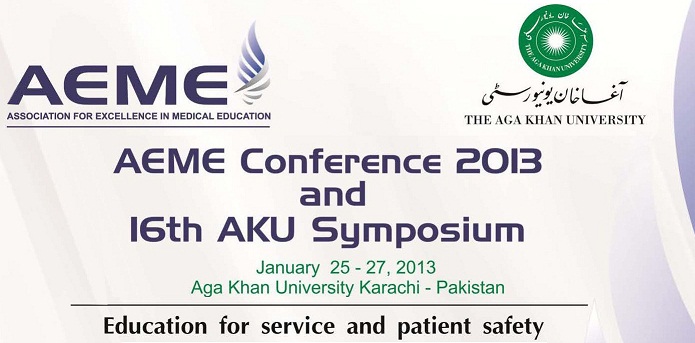Day 2 : Oral Presentations (Theme: Curriculum - Teaching & Learning)
PBL cases: video or paper?
Location
Lecture Hall 3
Start Date
27-1-2013 9:30 AM
Abstract
Background: Problem-based learning (PBL) is one of the pedagogical approaches utilized in the Medical College at Aga Khan University (AKU). In Years 1 and 2, clinical PBL scenarios developed by a multidisciplinary module committee are presented to students in the form of written (paper) cases from which students are expected to derive basic science learning objectives. In response to informal feedback by students and formal case evaluations, that revealed a decline in student interest in the PBL process, the Introductory module committee decided to test alternative methods of PBL case delivery, specifically, the use of video cases. The objective of this study was to assess the effectiveness of video cases versus paper cases as a delivery methodology for PBL.
Methods: Year 1 medical students (Class of 2016) at AKU and the facilitators of the Introductory module were requested to complete a brief structured questionnaire after each PBL case (two paper and two video). Case evaluations of the two video cases for Class of 2016 were also compared to the case evaluations of the same cases delivered as paper cases for the Class of 2015.
Results: Eleven facilitators, one each for eleven PBL groups, and 99/100 students consented to participate in this study. 392 (98% response rate) students’ and 42 facilitators’ (95% response rate) questionnaires on four cases were evaluated. Students found paper cases more effective compared to video cases (P= 0.001), while no significant difference was observed in facilitators’ preference (P = 0.19).
Conclusions: Students preferred paper over video cases, which may be linked to quality and content of video cases. Video cases can still be used to increase student interest, but preferably in the second half of Year 1 or in Year 2, and should ideally be created for observation-intensive scenarios.
Key words: Problem-based learning, video cases, paper cases
PBL cases: video or paper?
Lecture Hall 3
Background: Problem-based learning (PBL) is one of the pedagogical approaches utilized in the Medical College at Aga Khan University (AKU). In Years 1 and 2, clinical PBL scenarios developed by a multidisciplinary module committee are presented to students in the form of written (paper) cases from which students are expected to derive basic science learning objectives. In response to informal feedback by students and formal case evaluations, that revealed a decline in student interest in the PBL process, the Introductory module committee decided to test alternative methods of PBL case delivery, specifically, the use of video cases. The objective of this study was to assess the effectiveness of video cases versus paper cases as a delivery methodology for PBL.
Methods: Year 1 medical students (Class of 2016) at AKU and the facilitators of the Introductory module were requested to complete a brief structured questionnaire after each PBL case (two paper and two video). Case evaluations of the two video cases for Class of 2016 were also compared to the case evaluations of the same cases delivered as paper cases for the Class of 2015.
Results: Eleven facilitators, one each for eleven PBL groups, and 99/100 students consented to participate in this study. 392 (98% response rate) students’ and 42 facilitators’ (95% response rate) questionnaires on four cases were evaluated. Students found paper cases more effective compared to video cases (P= 0.001), while no significant difference was observed in facilitators’ preference (P = 0.19).
Conclusions: Students preferred paper over video cases, which may be linked to quality and content of video cases. Video cases can still be used to increase student interest, but preferably in the second half of Year 1 or in Year 2, and should ideally be created for observation-intensive scenarios.
Key words: Problem-based learning, video cases, paper cases

